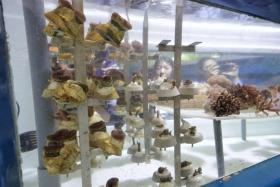New mosquito breeding facility opens in AMK to help fight dengue here
The war on dengue has received a boost with the opening of a new facility in Ang Mo Kio that can breed millions of mosquitoes a week to prevent urban female Aedes aegypti mosquitoes from producing offspring.
The launch yesterday comes at the tail end of a year in which Singapore has experienced its third-biggest dengue outbreak. As of Nov 21, more than 14,470 people here had been infected with the disease, with 20 lives lost.
The new facility will allow the National Environment Agency (NEA) to scale up Project Wolbachia by producing up to five million mosquitoes a week.
The project involves the release of male Wolbachia-Aedes aegypti mosquitoes to suppress the urban Aedes aegypti mosquito population, which is the primary vector of dengue, chikungunya and Zika here.
When the released male Wolbachia-Aedes aegypti mosquitoes mate with urban female Aedes aegypti mosquitoes that do not carry Wolbachia, the resulting eggs do not hatch.
Speaking at the launch of the new facility, Senior Minister of State for the Environment and Water Resources Amy Khor said: "If we are serious about confronting climate change and other challenges, dengue control cannot simply be just 'business as usual'. We cannot just do more of the same."
Dr Khor, who is also Senior Minister of State for Health, said the dengue situation is likely to worsen over the next few decades as a result of global warming.
This is because higher temperatures result in mosquitoes breeding faster, and cause the dengue virus to replicate at a quicker rate.
The new $5 million facility in Techplace II is expected to provide scalability in the production and release of Wolbachia-Aedes aegypti mosquitoes needed for Project Wolbachia.
NEA chief executive Tan Meng Dui said: "This facility and the technologies it houses will play a key role in Singapore's efforts to deploy Wolbachia technology as part of our integrated vector control programme to tackle these diseases (dengue, chikungunya and Zika)."
Get The New Paper on your phone with the free TNP app. Download from the Apple App Store or Google Play Store now


